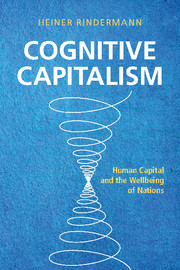Book contents
- Cognitive Capitalism
- Cognitive Capitalism
- Copyright page
- Contents
- Figures
- Tables
- Preface
- 1 Large Wealth Differences across Time and Nations
- 2 The Wellbeing of Nations
- 3 Human Capital, Cognitive Ability and Intelligence
- 4 International Ability Differences and Their Development
- 5 Why Some Are Richer, Freer and More Democratic
- 6 History, Culture and the Burgher-Civic World
- 7 Why Cognitive Factors Are Important: A Theory of Cognitive Capitalism
- 8 The Impact of Cognitive-Intellectual Classes
- 9 Methodological Research Problems and Solutions
- 10 Causes of National and Historical Differences in Cognitive Ability – and Reciprocal Effects
- 11 Global Models for Education, Cognitive Capital, Production, Wealth and Wellbeing
- 12 Challenges of Future Development and First Predictions
- 13 Models for Cognitive and Wealth Development in the Twenty-First Century
- 14 Summary, Comparisons and Suggestions
- References
- Index
6 - History, Culture and the Burgher-Civic World
Published online by Cambridge University Press: 01 February 2018
- Cognitive Capitalism
- Cognitive Capitalism
- Copyright page
- Contents
- Figures
- Tables
- Preface
- 1 Large Wealth Differences across Time and Nations
- 2 The Wellbeing of Nations
- 3 Human Capital, Cognitive Ability and Intelligence
- 4 International Ability Differences and Their Development
- 5 Why Some Are Richer, Freer and More Democratic
- 6 History, Culture and the Burgher-Civic World
- 7 Why Cognitive Factors Are Important: A Theory of Cognitive Capitalism
- 8 The Impact of Cognitive-Intellectual Classes
- 9 Methodological Research Problems and Solutions
- 10 Causes of National and Historical Differences in Cognitive Ability – and Reciprocal Effects
- 11 Global Models for Education, Cognitive Capital, Production, Wealth and Wellbeing
- 12 Challenges of Future Development and First Predictions
- 13 Models for Cognitive and Wealth Development in the Twenty-First Century
- 14 Summary, Comparisons and Suggestions
- References
- Index
Summary
The broad field of culture will be defined and structured. Worldview is the core of culture. Culture has a strong impact on the development of economy and politics and especially on education and competence. The central concept of ‘burgher-civic’ culture and its influence on societal wellbeing will be described. Finally, modernisation is understood as the result of reciprocal effects between culture, education, competence, society, institutions and economy best visualised as a spiral.
- Type
- Chapter
- Information
- Cognitive CapitalismHuman Capital and the Wellbeing of Nations, pp. 176 - 187Publisher: Cambridge University PressPrint publication year: 2018

